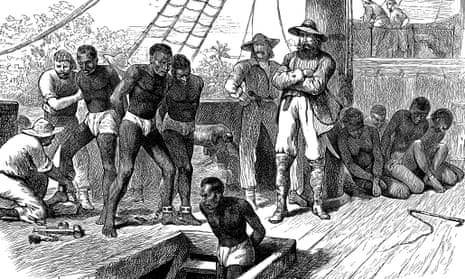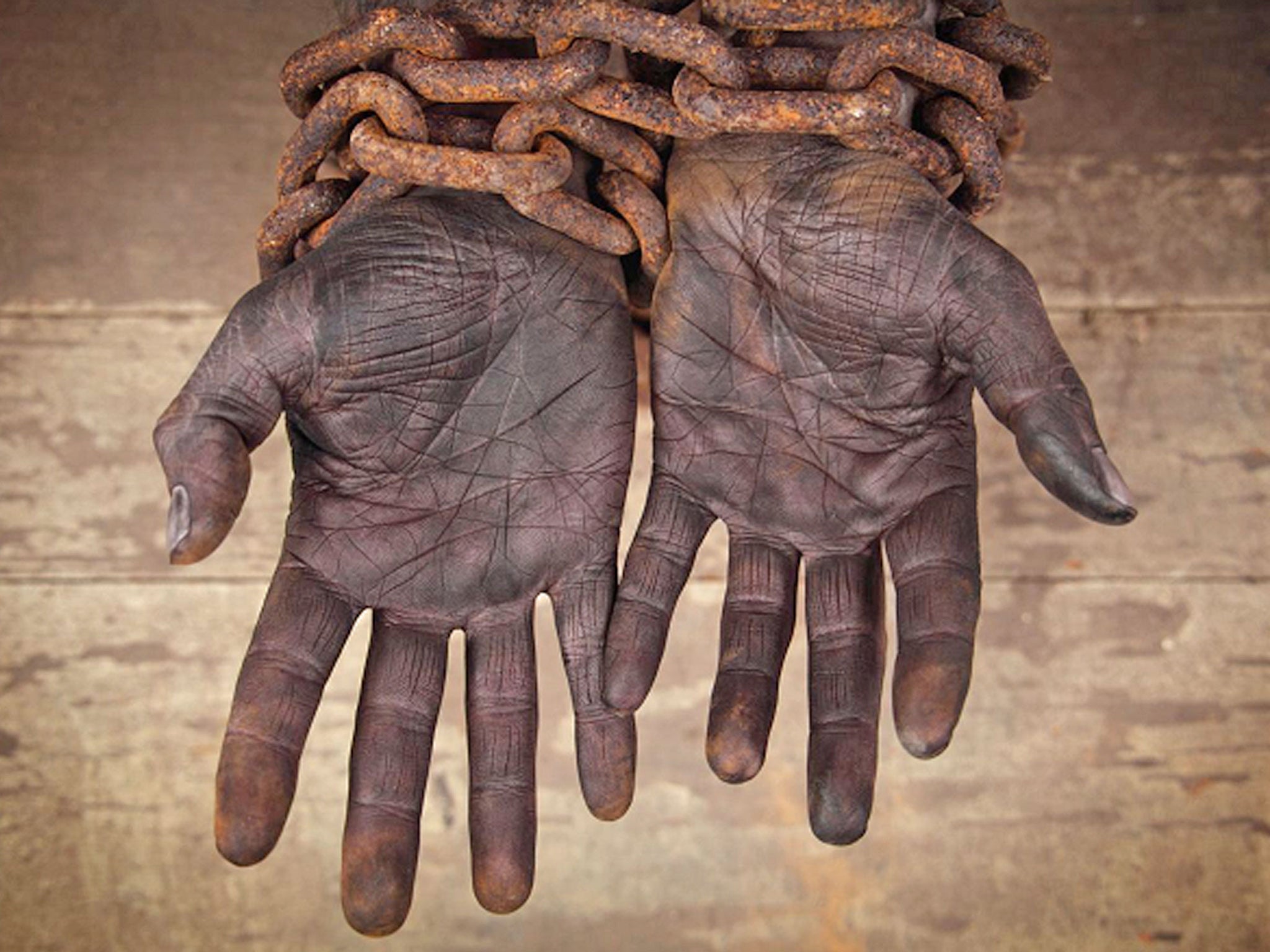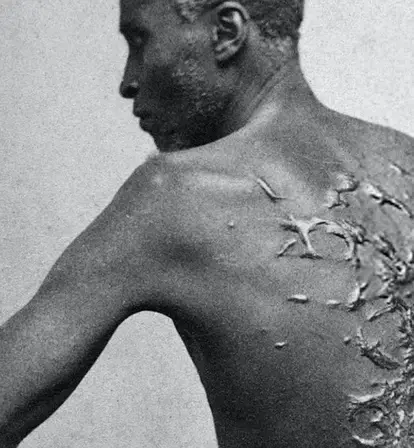‘A reckoning with our past must shape our future.
‘This has profound contemporary relevance in terms of our international obligations; not just of specific instances of restorative justice, but in recognition that Britain’s prosperity is built off the backs of communities with far slimmer economic means. Our international aid programmes and refugee commitments are not a matter of benevolent charity to be dispensed with when politicians are feeling miserly: they are what we owe the rest of the world.’- Observer editorial, 2 April 2023
‘When colonial slavery was abolished in 1833 the British government paid £20 million to slave-owners as compensation for the loss of their "property". In today's terms that figure equates to around £16.5 billion. The enslaved received nothing.’

A print shows African captives being taken on board a slave ship. Photo: Print Collector/Getty/ The Guardian
'Slavery is a central and indisputable fact of the nation’s past. But our failure to remember what really happened is more than mere forgetfulness.'
‘Nearly two centuries after slavery was abolished, this country has still not fully acknowledged the shameful part it played. We must delay no longer.’
‘Today’s generation is not responsible for what happened two centuries ago – but it can be guilty of refusing to learn from it.’
Lest We Forget
We Need to Talk about Slaves and Slavery
It is only when we know the truth and act upon it, we will become free and emancipated

Slavery on an industrial scale was a major source of the wealth of the British empire. Photo: (Getty Images)/ Via The Independent
‘The true scale of Britain's involvement in the slave trade has been laid bare in documents revealing how the country's wealthiest families received the modern equivalent of billions of pounds in compensation after slavery was abolished.’- The Independent
See also: Britain’s colonial shame: Slave-owners given huge payouts after abolition
The British kings and queens who supported and profited from slavery
The Colston connection: how Prince William’s Kensington Palace home is linked to slavery
‘The legacy of enslavement is relevant today’
‘Britain’s role in the transatlantic slave trade only cropped up twice throughout my formal education. Once in primary school, as I carefully evaded the gazes and glances of my classmates, and again as a history undergraduate. When my globalisation tutor asked us who had seen the Alex Haley miniseries on slavery, Roots my hand shot up. But not so many of my classmates’ hands joined mine in the air.
‘Last week UNESCO called on us to commemorate the International Day for the Remembrance of the Slave Trade and its Abolition. But in Britain we still have a tendency to celebrate the heroic whilst having convenient amnesia for the harrowing. We’re more likely to see the day marked with the celebration of slavery’s abolition than remembrance of the trade itself.
‘Write or Tweet anything about Britain’s role in the slavery or the slave trade and you will be met with some variation of ‘get over it’.
‘In school, I had two lessons on slavery, yet two years on Victorian Prime Ministers Gladstone and Disraeli. Gladstone’s father, John Gladstone, was paid £100,000 in compensation following the Slavery Abolition Act 1833 – today equivalent to about £80m. The slaves got nothing. And, depending on where you went to school, they might get much space on the curriculum either…’- Kimberly McIntosh, Policy Officer, the Runnymede Trust
What Kimberly has noted above, deeply resonates with me, at personal, emotional and educational level. As I had explained elsewhere:
‘...Our education, teaching and learning environment has obfuscated the truth, especially the historical truth…
Why is it that the great majority of the population in the west are totally unaware of what crimes their governments have been up to in other people’s lands?
Why is it that hardly anybody in Britain knows anything about the history of their country’s actions in my land of birth, Persia, the modern Iran, for example? An example, amongst many I could have mentioned!
Why is it that hardly anybody knows anything about perhaps the most well known oil company in the world, B.P. (British Petroleum), the former Anglo-Iranian Oil Company, and still further the former Anglo-Persian Oil Company?
Why is it that nobody knows anything about the riches that Britain got from Iran, in what Churchill had termed, ‘Pennies from Heaven’, enabling the British navy to rule the seas, maintaining, and nourishing the British Empire!
And then, as a token of their thanks to the people of Iran for all Britain had made from Iranian oil, Britain with the help and support of their former colony, the US, staged the first CIA/MI6 coup d'état against the democratically elected Prime Minister Mohammad Mosaddegh. A crime against humanity and international law that has pushed back the dream of democracy in Iran, if not for ever, but at least for generations to come…’
…And then I became a university lecturer, teaching economics and business at a few universities in England. In a career spanning a few decades, every year in international business classes, I asked my students to raise their hands if they knew anything about the most famous oil company in their country, namely, British Petroleum. And you know what, I never realised my dream of seeing a raised hand! And as the saying goes, the rest is history!!
The Evil Trade: The triangular slave trade that brought unimaginable riches to Britain

‘The triangular trade maximised profits at every corner of the shipping route. Guns and other goods were exported to Africa in exchange for captives. Captives were then shipped as slaves to the New World plantations. Finally, sugar, rum, tobacco and cotton were carried on the journey back to Britain...- The BBC
See also: Riches & misery: the consequences of the Atlantic slave trade
‘Britain’s true role in the slave trade must feature more prominently in our collective history and our national consciousness: not so that our political leaders should constantly apologise for Britain’s past wrongs, or that contemporary descendants of slave traders should bear an ongoing burden of shame, but so that we view Britain’s role in the modern world in the context of our history. Our international responsibilities cannot be understood devoid of that context. They are derived not just from the deep injustice of the structural inequalities that divide global north from global south but from the fact that in the past Britain has helped create those very inequalities.’
…’Our political leaders hardly make reference to the dominant role this country played in the global slave trade. British slave traders generated immense spoils by transporting 5.5 million African slaves to its Caribbean colonies, forcing them to work in terrible conditions on plantations in Jamaica, Barbados and beyond. A new database launched last week by academics at UCL, cataloguing the details of 20,000 British slave owners, illustrates the extent to which the historic wealth of the slave trade extends its reach into modern Britain: in the Georgian architecture of cities such as London, Liverpool and Bristol; in businesses such as Greene King and the Royal and Sun Alliance; in the several recent or serving MPs with slave owners in their family history.
‘The extraction of this wealth came at a terrible cost. Slaves were shackled and transported in appalling conditions aboard disease-ridden ships. Those who survived the journey were often treated with unspeakable physical and emotional cruelty. Countless lives were lost: by the time of abolition, the African slave population in the Caribbean stood at a small fraction of the total number of slaves who had arrived over the years.
‘The scars are still visible across Britain’s former colonies. After abolition, former slaves were left in abject poverty, a legacy from which no country has recovered. In Jamaica, Britain’s largest slave colony, 80% of its population lacked functional literacy at the time it was granted independence in 1962. In Britain, the wealth extracted from African slaves has continued to contribute to our society flourishing long after slavery was abolished…’-Observer editorial, 25 September 2016
See also: Observer editorial, 2 April 2023
…‘Today people will say “we won the war”, even if they didn’t fight and even if they weren’t born. They will say “we won the World Cup”, even if they didn’t play or weren’t born. Nobody takes the “we” literally. It signifies a collective identity that can span centuries and experiences. But when you mention slavery or colonialism, the same people will say: “I am not responsible. I wasn’t alive. I wasn’t there.” The collective, historical British identity that people would otherwise embody in moments of victory and national pride becomes suddenly and urgently estranged and elusive when it comes to less flattering periods in our history. This contradiction is clearly unsustainable.’...-LEST WE REMEMBER: HOW BRITAIN BURIED ITS HISTORY OF SLAVERY
‘...Everyone in Britain and the rest of the developed world has benefited from at least 200 years of cheap tobacco, coffee, chocolate and, above all, tea and sugar, produced by slaves or indentured labourers (or, today, low-paid workers) in conditions even worse than those his forebears experienced in Manchester and Salford in the 1840s. In addition, they were probably paid to make clothes out of raw cotton grown by slaves in the southern United States.
‘The direct responsibility for slavery certainly lies with the slavers and plantation owners, including the British royal family and most of the aristocracy and merchant classes who invested in the hateful trade. But the moral responsibility has to be borne much more widely and should be in our minds whenever we buy “cheap” goods today.’- Prof Sir Roderick Floud
‘After the abolition of slavery, Britain paid millions in compensation – but every penny of it went to slave owners, and nothing to those they enslaved. We must stop overlooking the brutality of British history.’-When will Britain face up to its crimes against humanity?
Genocidal Brutality of the Slave Trade

Photo:‘Whipped Peter’ And The Photo That Exposed Slavery’s Horrors
…’African holocaust is the appropriate term for the systematic enslavement, terror, and slaughter at the heart of slavery. There is no agreed upon figure for how many people died in the system, however Patrick Manning estimated in 1998 that four million people were killed by the process of taking people from Africa and another 1.5 million died while on the slave ships. This gives us a conservative estimate of 5.5 million deaths, one which doesn’t even begin to include the number of Africans who were killed during their enslavement in the Americas (some 10.5 million survived the journey, according to Manning). Considering that C.L.R. James argues in Black Jacobins that the Haitian revolution came about in part because it was common practice to work the enslaved to death, the toll could easily stretch past ten million. And yet, particularly in Britain, the brutality is sanitised in the course of remembering and teaching transatlantic slavery…’-Confronting the brutal reality: how to teach the legacy of transatlantic slavery
Reparation and the Path to Restorative Justice
Breaking the Chains of Slavery

Illustration by Mawuena Kattah/ via The Guardian
‘Groups that advocate for reparations almost never seek only money … The social, the political and the economic are bound together and must be addressed together, creating the possibility of a better world.’- MORE THAN MONEY: THE LOGIC OF SLAVERY REPARATIONS
‘If we can’t speak honestly about Britain’s links to slavery, we turn our backs on change.’
‘British politics has an unusual obsession with Britain’s past. In some sense this should not be remarkable: the writing of history takes place in the present, and the story any nation tells about itself is therefore always a political one. But in Britain, it is only ever that: contemporary debates about British history are distinguished by their lack of historical content. Instead, they are merely a new way of posing an old question: does Britain need to change, or is it great the way it is?
This is why attempts to revise and update conventional accounts of British history are so fiercely and reflexively rejected. Britain’s past, or a glorious version of it, is so central to maintaining the status quo that to question our history is to invite dramatic charges of vandalism and erasure – from those who seem to believe the past is like an antique vase that might be shattered if too many people lay their hands on it…’- Continue to read
Related articles: A pick from our archive
N.B. As an educator with decades of teaching at universities in Britain, I am ashamed of the failure of our education system and amoral teaching that has so manifestly and clearly failed to tell and teach the truth to today’s generation about how much of their country’s ‘greatness’ is owed to the exploitation of enslaved people and the plundering of their land and resources. This, to my mind, is nothing short of a very shameful abdication of responsibility of always teaching truthfully and not engaging in falsehood and propaganda; and forgetting the wise words of John Ruskin:’To make your children capable of honesty is the beginning of education.’
Must-read Books: The history they don’t want you to know
Brexit, Trump and the failure of our universities to pursue wisdom
The rise in global fascism: A failure of education?
Want to know Why Brexit, Trump, Populism and Fascism: Read the books you did not read in school!
